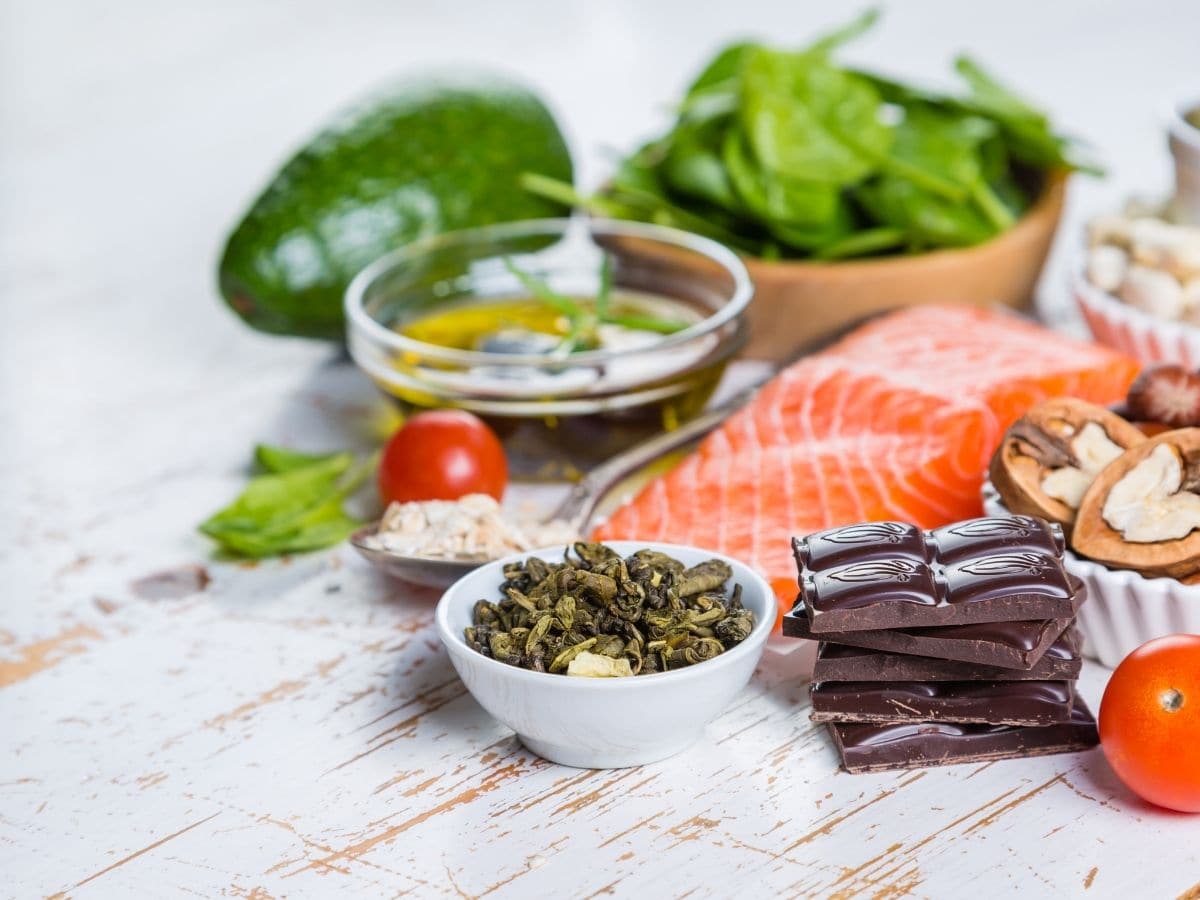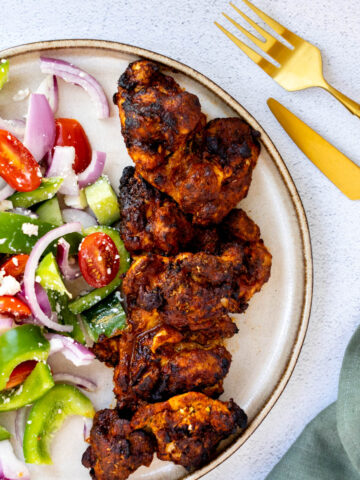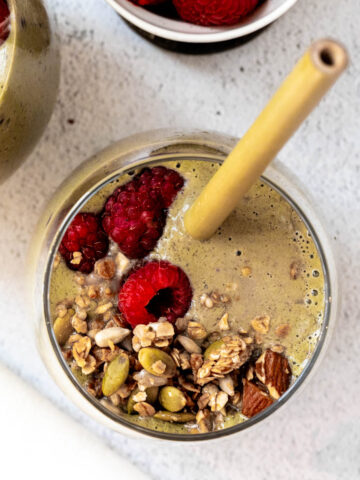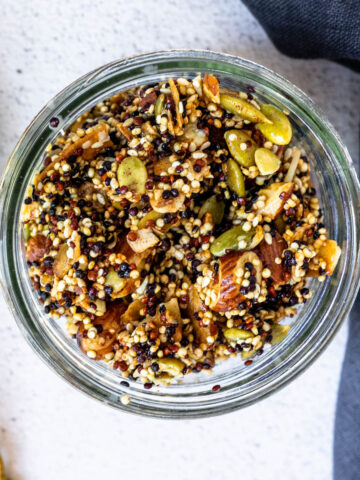So, what is a holistic nutritionist? Whether you're simply curious or you're interested in a new career path, I'm sharing everything you need to know below.

A holistic nutritionist is a health practitioner who takes a natural approach to managing health through nutrition, lifestyle and environmental factors.
If that piques your interest, read on. I'm a certified holistic health and nutrition coach, and today I'm sharing all the details on what it means to work in holistic nutrition.
Jump to:
- Fast Facts
- What is holistic nutrition?
- What does a holistic nutritionist do?
- Where do holistic nutritionists work?
- How do you become a holistic nutritionist?
- What is the difference between a dietitian, a nutritionist, and a holistic nutritionist?
- Evaluating accredited holistic nutrition programs
- Related posts
- Simple holistic recipes
Fast Facts
- Holistic nutritionists seek to understand and treat the whole person through nutrition and lifestyle recommendations.
- They can be self-employed or work within an integrated team.
- Licensed holistic nutrition practitioners have taken a program from an accredited institution.
- Holistic health professionals are not a replacement for registered dieticians or nutritionists. Instead, they should work alongside these health practitioners to prevent disease and promote good health.
What is holistic nutrition?
It's a natural approach to health that takes a comprehensive look at mind, body and soul to promote good health and prevent disease. It encourages you to care for your whole self through a clean diet and positive lifestyle habits. If you want to know more, here's everything you need to know about holistic nutrition.
What does a holistic nutritionist do?
Holistic nutritionists are specialized nutritionists who help patients prevent illness and manage their health through the use of natural foods and remedies, as well as healthy lifestyle recommendations. They seek to understand and treat the "whole" person instead of curing isolated symptoms.
Where do holistic nutritionists work?

Obtaining my holistic health and nutrition coach certification from Nutraphoria opened up so many possibilities for me. Thanks to a comprehensive, in-depth education in nutrition, I finally felt confident enough to launch a health and wellness blog. Now, I feel like I'm living my dream, running a site that helps people make positive food and lifestyle choices.
If you have a similar dream, that's great. If you have a different goal, that's great too. The beauty of a holistic health certification is that you can help people navigate the confusing world of wellness and nutrition in a myriad of ways.
Whether you want to grow your own business or work within a team, there is a possibility for you. Here are some of the most common ways to practice holistic nutrition:
- Work in an integrated clinic, health food store or gym as a holistic health advisor
- Work one-on-one with clients
- Host educational workshops
- Run a holistic health or recipe blog
If this sounds like an interesting career path to you, then keep reading to find out how to get started with an accredited holistic nutrition program.
How do you become a holistic nutritionist?
While there is not a degree in holistic nutrition, there are a number of schools that offer accredited certification programs that will allow you to turn your passion for health into a career.
These programs not only provide you with an in-depth understanding of holistic nutrition, but also allow you to register for a professional designation and get liability coverage for your practice. This is important because it signifies to potential employers and future clients that you have taken an approved educational program and are qualified to coach.
Different legislations have different titles. But, here are some of the designations you may be able to get:
- In USA: Board Certified in Holistic Nutrition, Certified Nutrition Professional
- In Canada: Registered Holistic Nutritionist, and Certified Holistic Nutrition and Health Coach
What is the difference between a dietitian, a nutritionist, and a holistic nutritionist?
Dietician vs nutritionist? Nutrition coach vs nutritionist? Holistic nutritionist vs dietician? It's confusing out there, so I'm going to try to simplify it for you.
To do so, I'll highlight the key differences between a dietician, nutritionist and holistic nutritionist. While all are considered dietary experts, their education and approaches vary.
Dieticians educate individuals and populations on the use of food to prevent and treat disease They often work in institutions like hospitals, schools, long-term health facilities and research centres. Because they are strictly regulated, their advice closely follows government guidelines. There is a lot of education required to become a registered dietician, requiring a masters degree in most places.
Unlike dieticians, nutritionists are generally not allowed to diagnose or treat medical conditions. Instead, nutritionists typically work with individuals or populations to educate them about general nutrition and encourage them to make positive food behavior changes. This includes creating and implementing meal plans. In most places, nutritionists require a Bachelors of Science degree.
A certified holistic health practitioner, like a nutritionist, will often work one on one with clients to promote positive health changes. They are more interested in understanding the person as a whole and treating the interaction between diet, lifestyle and environment. While they do make general nutrition recommendations, they also educate on natural approaches to healing the body, like eating organic, using adaptogens, stress management techniques or ayurveda. Practitioners are required to take an extensive certification and complete practicum hours before graduating.
Holistic nutrition is not a replacement for general nutrition. In fact, it's not uncommon to see holistic health professionals work alongside registered dieticians, nutritionists and other health practitioners. It's my belief that conventional and alternative medicine should work together to create the happiest, healthiest you.
Evaluating accredited holistic nutrition programs

If you're still reading this, I'm assuming you're interested in taking a holistic health program.
As the discipline rises in popularity, so do the number of holistic nutrition schools offering certification. So, how do you choose a good one? Here are my top tips.
- Make sure it's an accredited program. Be sure to choose a reputable program that gives you the opportunity to apply for a professional designation and liability insurance upon completion. Canadians, you can find approved schools here. Americans, you can find approved schools here.
- Look at the program length. To gain the wealth of knowledge, confidence and coaching skills necessary to be a health coach, you should be enrolled in a program for at least one year. Anything shorter is a disservice to yourself and will you leave ill prepared for the real world.
- Evaluate the teaching methods. A good program should test your knowledge every now and then. It should also include practicum assignments that prepare you to work with real clients and help you build your own unique coaching style.
- Consider how long the school has been operating for. To choose a high quality, reputable school, you may want to ensure its stood the test of time. Mature programs likely have the best instructors and strong curriculums.
- Decide whether you prefer in-person vs online. Both have their pros and cons. Online learning offers flexibility, especially if you're taking this program on top of other life commitments. In-person offers more hands-on learning and networking opportunities.
- Connect with alumni. Before applying for any program, I suggest reaching out to alumni. A good school should share alumni success stories on their website and be willing to connect you with recent graduates. This will help you understand the program better and whether it's a fit for you.
Related posts
Feeling inspired? Here's where you can learn more about holistic health and clean eating.
Simple holistic recipes
A holistic approach to nutrition is all about eating clean food that's as close to its natural state as possible for optimum health and wellbeing. And, that's the philosophy I follow when creating recipes for Caitey Jay.
Feel free to check out the recipes I hand selected for you below or peruse my entire recipe collection here.
Have more questions about holistic nutritionists? Leave them in the comments below.










Leave a comment!